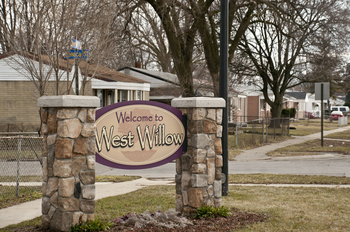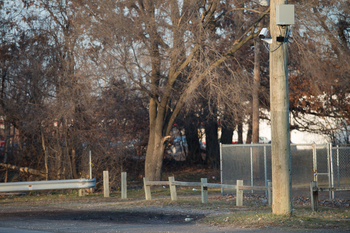Cost is an obstacle as Ypsilanti Township tries to meet high demand for security cameras
In response to demand from neighborhood associations, Ypsilanti Township is exploring expanding the public camera surveillance program it piloted in West Willow.
But the cost of purchasing, installing and providing service for the cameras is expensive, and neighborhoods will likely have to pay for the cameras with residents’ own money.

The West Willow neighborhood of Ypsilanti Township has been a pilot site for surveillance cameras.
Tom Perkins | For AnnArbor.com
The trustees did not take any action, though they may at a future meeting.
West Willow, for example, has five cameras that monitor the few entrances to the neighborhood and several other areas within. Those cost the township around $30,000 in the first year.
“What has happened is that it’s an expensive endeavor,” Allen said. “We’re not having appropriate funding, and we can’t continue to do that at the current funding rate and with the millage situation.”
The township is asking residents to approve increases for three millages in November and has been hit particularly hard by the loss in revenue from decreasing property values.
Allen said the Board of Trustees would have to approve how to handle charging residents for cameras, but he said one idea is having the neighborhood associations vote on camera installation. If the vote passed and the cameras were installed, the charges could potentially be rolled into residents’ tax bills.
But Allen said he doesn’t know if such an approach is even legal or how fluctuating rates would be handled.

Ypsilanti Township has added cameras over the past year including this one in Harris Park.
Courtney Sacco | AnnArbor.com
In May 2012, the images provided by the cameras directly led to the arrest of a man accused of sexually assaulting several minors in West Willow.
The cameras are fixed in place in five locations, cannot zoom, only record public places and do not face any homes. The cameras are wireless, transmit images via cellular service and are attached to DTE Energy-owned utility poles. The camera and its supporting metal pole can be moved and reattached to a different utility pole if necessary.
The cameras start recording still images upon detecting motion in an area and transmit full color images back to a central computer. The images are selectively downloaded by the sheriff's department for investigative purposes. Images not downloaded are over-written by the device every four to five days, depending on the volume of activity.
The cameras don’t provide a live stream and no one regularly monitors the recordings. Instead, police could preview and download the images from a local computer at the police station as needed. Multiple deputies are trained in using the equipment.
"I would say there's high demand for the cameras," Allen said. "Now would that stay the same based on costs residents would be charged? I don't know."
Cameras were also placed in Harris Park and the Grove Park Neighborhood.
The cost to purchase one camera is $3,900, and a server that would support 32 cameras is an additional $3,800. Installation costs another $600 per camera.
Verizon’s 4G service costs $40 per month, which costs an additional $480 annually. There is a one-time setup charge of $250 and an annual system charge of $500. Camera and software service charges of $141 per month add nearly an additional $1,700 to the annual bill.
Tom Perkins is a freelance reporter. Contact the AnnArbor.com news desk at news@annarbor.com.


Comments
Ben Petiprin
Wed, Jun 5, 2013 : 4:32 a.m.
Such a decision shouldn't be left up to a couple of busy bodies in the respective neighborhood associations. And then they'd charge everyone for the privilege of being watched. Put it up to a vote. A city wide vote.
John Hritz
Mon, Jun 3, 2013 : 7:19 p.m.
Using cameras is a cost / benefit tradeoff and this decision is missing the cost offsets of reduced policing, property damage, etc. But like other commentors, I'm not a fan of cameras since they aren't shown to be a deterrent or to help in dealing with crimes in process. Most of their value is in piecing together what happened after the fact.
Nicholas Urfe
Mon, Jun 3, 2013 : 1:04 p.m.
Speaking of cameras recording crime.. Did the sheriff's department ever release the video that of that woman's car being burgled, possibly by a sheriff's command officer? I think it may have been ypsi township. This is relevant to this story because camera footage must be available to everyone, not just the police. History in other cities has shown that video often gets "lost" when it captures incidents that do not reflect favorably on those who control the video.
Tru2Blu76
Mon, Jun 3, 2013 : 1:03 p.m.
As a former purchasing professional (manufacturing) and one with 8 years experience in security monitoring devices, I would address the following statement: (""I would say there's high demand for the cameras," Allen said. "Now would that stay the same based on costs residents would be charged? I don't know.") in this way: Then lets do the research and find out the answer. I don't have time to do that research any more. I'd do it as a professional courtesy if I could. I'd like to know what professional purchasing acumen has been applied to this project so far. I will say: this project moves all purchasing considerations into the "municipal" or "public" environment, where economies of scale (or of any kind) are too often left off the table. Example: when economics entered the area of "911 Emergency calls" - those in charge transitioned the 911 call system up to the county level from the individual city level. It seems to me likely that Ypsi has its own purchasing department. I wonder if, for this particular acquisition, whether or not the buying contract could be (or should be) handed up to a larger purchasing department - say at the county level, which would cover possible buys for several cities rather than just for Ypsi. As for the question posed by Mr. Giariola: I think it's widely understood that "public activities" are not protected and that neither "private" or "public liberties" are infringed, only "criminal activities" which take place in public places - something we'd all like to have more of. Furthermore, RE: "The cameras are fixed in place in five locations, cannot zoom, only record public places and do not face any homes." - Though many disagree, any portions of private property which are visible from public vantage points are not protected from observation - or from law enforcement.
Hugh Giariola
Mon, Jun 3, 2013 : 11:40 a.m.
Although I cannot deny the success the cameras have been in West Willow, I am still very leery of them from a personal liberty standpoint.
Jonathan Blutarsky
Wed, Jun 5, 2013 : 2:36 a.m.
I guess it depends upon what you do immediately next!
Hugh Giariola
Tue, Jun 4, 2013 : 2:11 a.m.
@Jonathan, what if the camera gets a really nice shot of me picking my nose?
Jonathan Blutarsky
Mon, Jun 3, 2013 : 5:53 p.m.
Hugh - would you please explain how the cameras as explained in the article violate anyone's "personal liberty"(?)